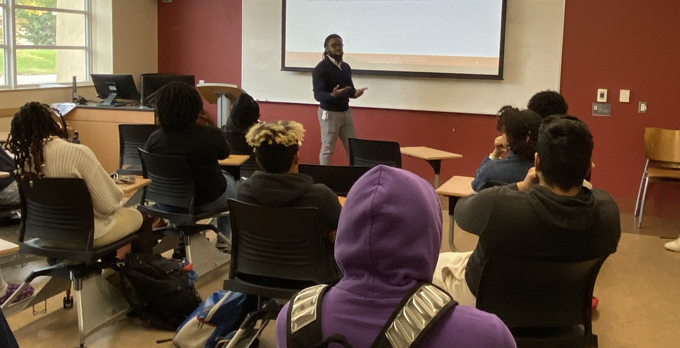Not many people think about how criminal justice intersects with public health. But Verlin Joseph, PhD, MPH, who was recently hired as a professor at The University of New Mexico's College of Population Health (COPH) has spent over a decade exploring this topic, especially as it relates to individuals who are dealing with substance use disorders. With a commitment to reducing stigma and discrimination, Joseph's work is set to ignite transformative change in the field here in New Mexico,
At COPH, Joseph works with a team of students and researchers as well as The University of New Mexico Center on Alcohol, Substance Use And Addictions (CASAA). The group has been collaborating to develop measures to combat stigma and discrimination for individuals incarcerated or arrested who have substance use disorders. His ongoing efforts with CASAA have generated valuable programs and interventions that could significantly improve lives.
As an epidemiologist, Joseph's journey into this field was unconventional but deeply inspired. His dissertation on cannabis use and pain provided a foundation that led to a desire to tackle stigma and discrimination related to substance use.
New Mexico’s high incarceration rates and pressing substance use issues became the focal point for Joseph's work. The state's willingness to confront these problems, despite limited resources, makes it a compelling and promising setting for transformative change.
One of Joseph's initiatives is the Justice Community Opioid Innovation Network, a part of a larger nationwide effort funded by the National Institutes of Health (NIH) and the National Institute on Drug Abuse (NIDA). This network involves multiple sites across the U.S., each taking a unique approach to addressing opioid use disorders within the criminal justice system. Joseph's work aims to train corrections and parole staff while assessing the stigma associated with opioid use disorders. His approach considers both internalized and enacted stigma, seeking to understand the perspectives of individuals receiving treatment as well as the professionals providing it.
Beyond data collection and assessment, Joseph's vision extends to introducing diversion programs within the criminal justice system. These programs offer an alternative to arrest and incarceration, providing young individuals with a second chance and the opportunity for rehabilitation.

We can actually walk through a scenario. You have a juvenile in the age range of 14 to 18-years-old who is found with drugs at school by police. If this child is arrested, charged, and convicted, this could potentially lead to being expelled from school. This can be traumatic and stigma inducing on them, and that child could become more of a burden on our economy in the long run. Instead of giving that child a criminal record, they could go through a program, and after completion, their record is expunged in the hopes that it doesn't result in them dropping out of school for a mistake that happened.
The ultimate goal is to break the cycle of stigma and recidivism, allowing individuals to continue their education and contribute positively to society. Through a new grant, Joseph intends to launch educational activities that reduce stigma, particularly in the Santa Fe area, where police interactions with juveniles have been a significant concern.
While the path to reform is complex, Joseph remains committed to his work and the vision of transforming New Mexico into a national leader in addressing substance use disorders and the criminal justice system's challenges. By successfully implementing these initiatives, he aspires to create a brighter future for countless individuals and initiate profound changes in the criminal justice system.
